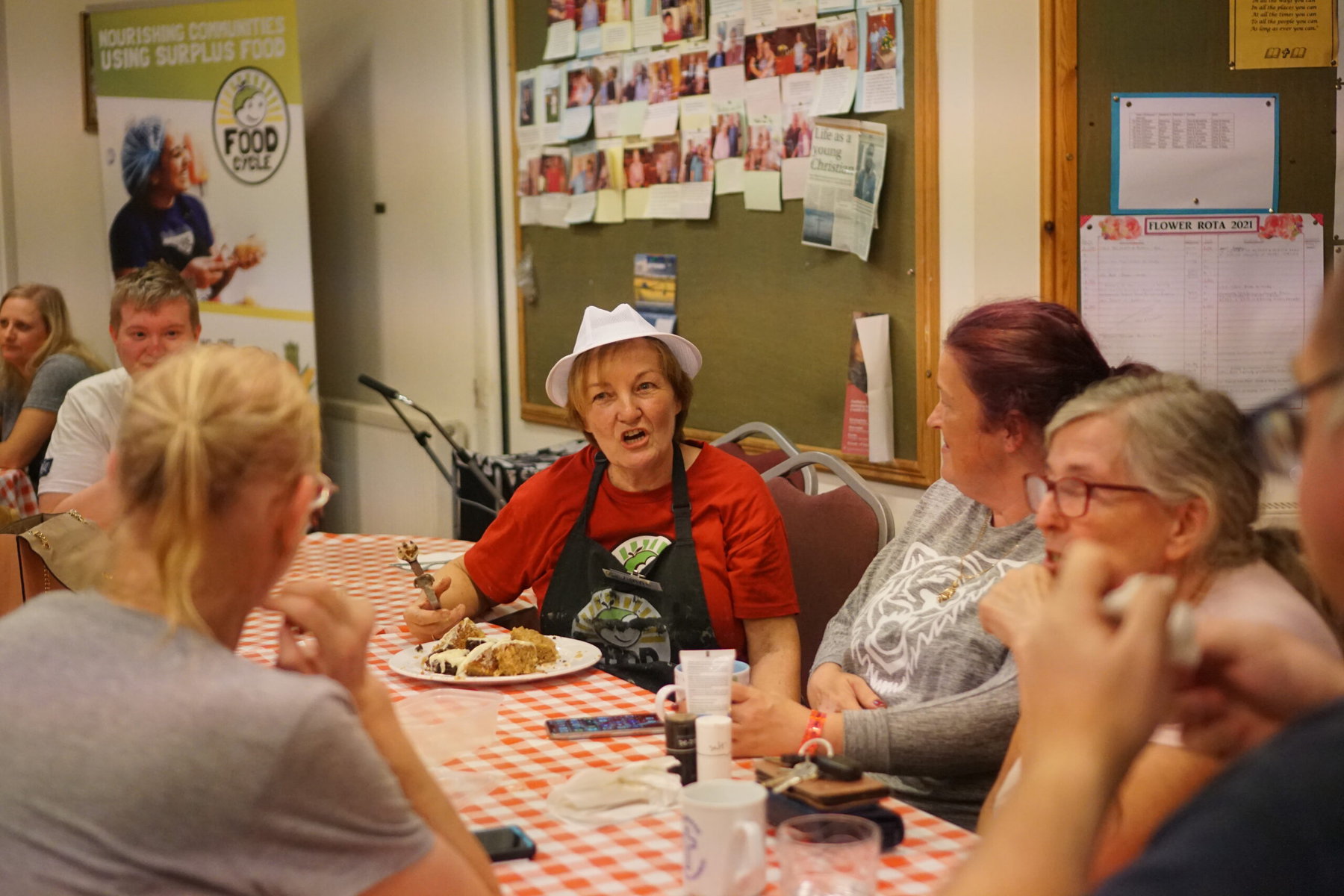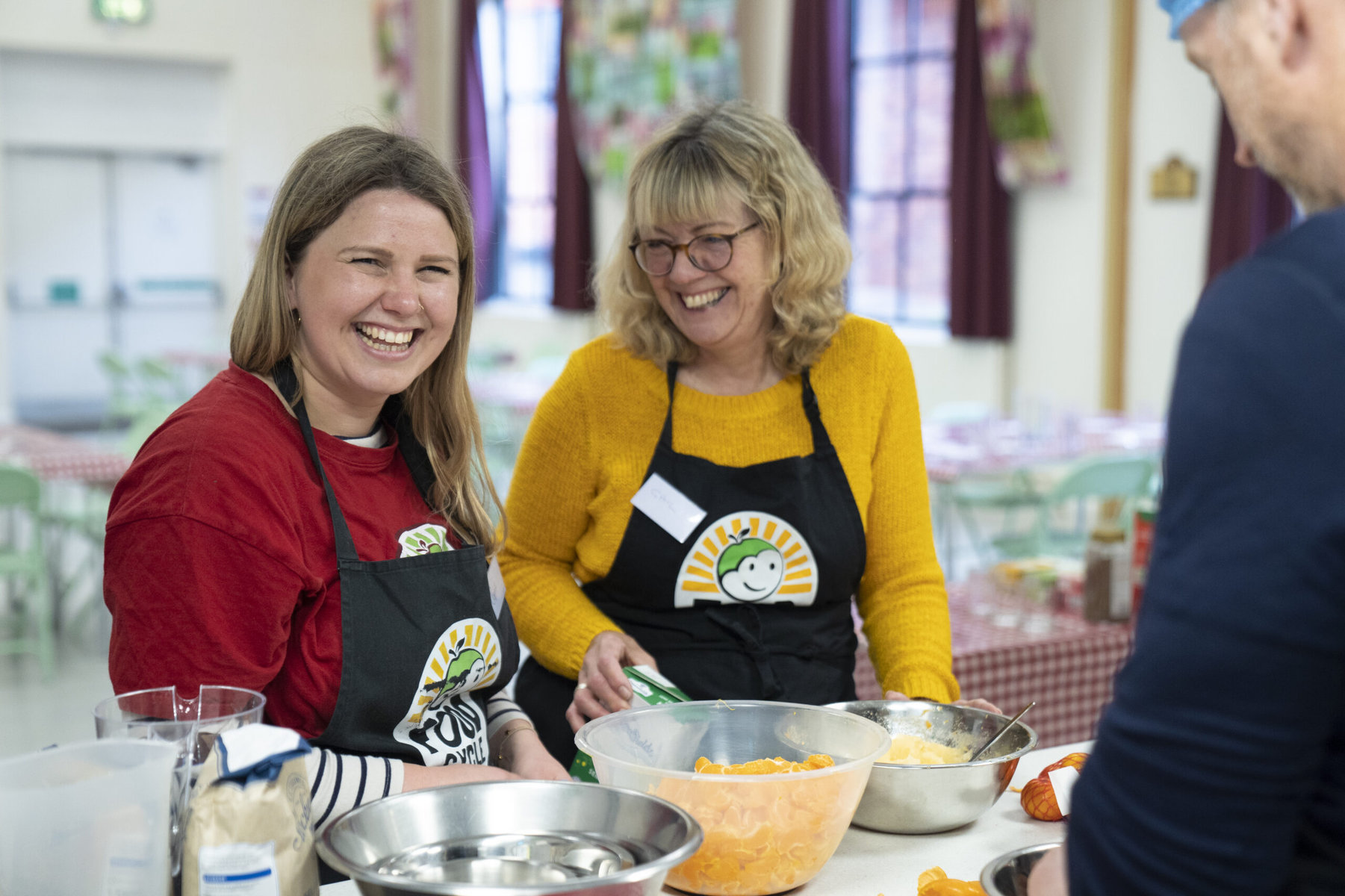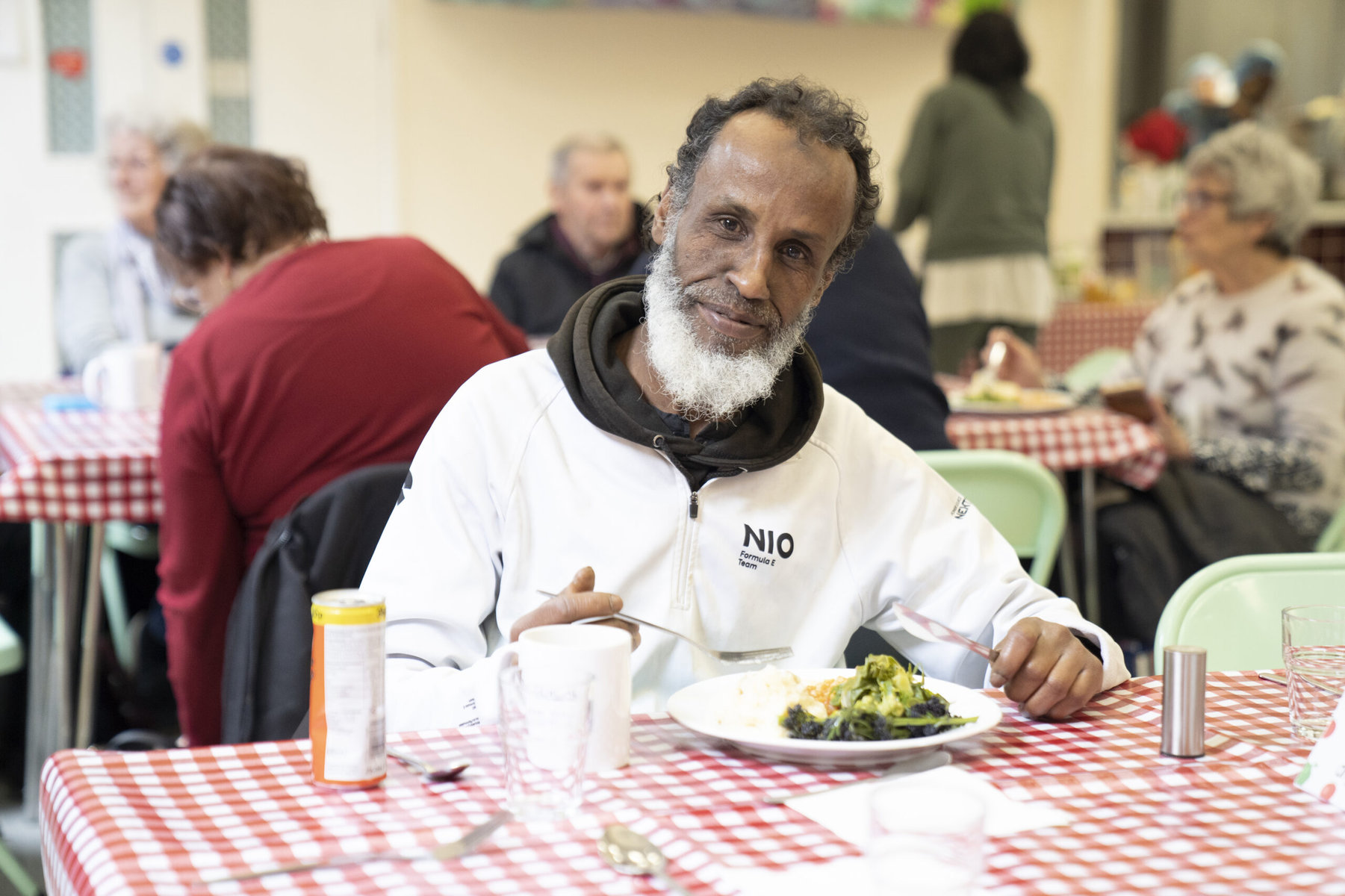Brandon, Jackie and Julie meet for dinner every Thursday, sitting at their regular table, and often going out afterwards to a pub quiz nearby. They talk about possible quiz topics and whether they can beat their previous performance, as they dine on a freshly prepared three course meal. Servers in black aprons swiftly bring them warm bowls of freshly made butternut squash soup, hearty vegetable cottage pie, and apple crumble covered in steaming custard, a perfect antidote to a cold evening.
As they leave, there’s no check to pay for this generous meal. The pop-up cafe at a church hall in Chelmsford, England is one of 80 held across the country throughout the week. They’re an initiative of FoodCycle, the UK’s largest community dining organization, which turns produce that supermarkets would otherwise throw out into a free meal for anyone who wants to attend. In 2022, FoodCycle’s pop-up cafes served nearly 500,000 meals to 62 communities across the UK, saving 209 tonnes of food from going to waste.
It might be a small dent in the 9.5 million tonnes of food waste the UK as a whole throws out each year, but FoodCycle’s impact is much bigger than this. Forty-three percent of people who attend FoodCycle meals, like Jackie and Julie, live on their own, with 68 percent of them feeling lonely, according to a survey of 910 FoodCycle guests in 2022. Loneliness is considered to be a significant mental and public health issue in the country, affecting over half the population, with the Mental Health Foundation linking it to depression and declining physical health.

Food poverty is FoodCycle’s third reason for being. Around 4.7 million people in the UK, or seven percent of the population, are considered to be in food poverty — defined by the government as not being able to secure “an adequate quality or sufficient quantity of food in socially acceptable ways.” Sixty-eight percent of FoodCycle guests worry about affording food, and 92 percent are concerned about the increasing price of food, to the extent that 75 percent regularly skip meals.
“These issues are intertwined and interlinked. We know there’s a correlation between people who are facing food poverty, and feeling isolated and disconnected from their communities,” says Sophie Tebbetts, FoodCycle’s head of programs and incoming CEO from January 2024.
Crushed by negative news?
Sign up for the Reasons to be Cheerful newsletter.And the need, Tebbetts says, is only growing: “We’ve really seen over the last couple of years in particular the cost of living impacting our guests — we have just reached over 100,000 community meals so far this year, and we’re definitely seeing guest numbers rising across our locations and the need becoming larger.”
As a result, FoodCycle plans to expand to 100 weekly community meals in the next year, and is on a drive to boost its 6,000-strong volunteer base of cooks and servers. Some of its most well-attended meals serve up to 80 guests, making it a challenge each week for volunteers to devise a nutritious, tasty, well-rounded meal from donated supermarket produce that they will only get their hands on three hours before dinner service begins.

For many families that attend, it’s their weekly meal out as they can’t afford to go to a restaurant. During the school vacation period, it’s a lifeline for those whose children would otherwise have their single hot meal of the day at school under the government’s Free School Meals program. “It’s amazing how it is 2023 and we have that stark situation for so many people,” says Tebbetts.
The majority of FoodCycle’s weekly community meals are open to anyone, a factor which Tebbetts believes is more important than it might seem.
“Life is difficult for a lot of people. There’s a lot of stuff going on. What we want to do is create safe, warm, welcoming spaces where people can just come and connect with each other. They don’t have to prove they are in need of a free meal,” she says. “If you are struggling and are feeling isolated financially, or with your mental health, there are a lot of things you have to prove in terms of accessing help. We want to remove all of that.”
There are, however, three FoodCycle locations that have been designed for specific demographics and are open only to those groups. In Acton, West London, and Dalston, East London, weekly meals run exclusively for refugee mothers and their children, while in Stepney Green, East London, a meal is held for people living with HIV.
“Often when refugees are housed, they don’t have space for tables to sit down and eat at. So to create spaces where they can sit with others and share a meal is really important,” says Tebbetts.
Nutrition, Tebbetts notes, is really important for the health of those living with HIV: “Around 40 percent of our guests have long-term health conditions, so their diet is key to maintaining a healthy lifestyle. We also know that if you’re on a low income, you actually can’t afford to purchase what the government recommends as a nutritious meal in its Eat Well guide. We pack our meals full of fresh fruit and veggies to help up their nutritional intake during the week.”

How the rising cost of living is impacting FoodCycle itself is not lost on Tebbetts. Venues — typically church halls or community centers, as they are most likely to have the space and kitchen facilities — are facing their own financial pressures and are becoming more reluctant to offer their spaces for free. For supermarkets, of course, it’s a no-brainer to donate produce that would otherwise be wasted, but FoodCycle still needs to purchase ingredients like herbs, spices, eggs, cheese and pasta to stock its “pantry” to turn those donations into proper meals (all vegetarian, for health, safety and inclusivity reasons).
That’s where corporate partners come in, making up over 40 percent of the £1.8 million (around $2.2 million) in income FoodCycle generated last year to cover its operating costs. Companies like Goldman Sachs have even taken part in FoodCycle Food Invention challenges, with teams creating meals from donated produce to donate to communities in need.
The difference being made is clear. Eighty-one percent of FoodCycle guests in the 2022 survey said they felt less lonely since attending their community meal, and 90 percent said they felt well-fed. Andrew, for example, lives on his own and is unemployed, living off just £14 (around $17) a week for food. “Over and above the food side of it, I like the companionship of meeting people socially and having a chat because most weeks I don’t see anybody. From the social aspect it is very warming,” he told FoodCycle.
Pensioner Sylvia, meanwhile, takes three buses over an hour and a half journey to get to her local FoodCycle meal, giving her a reason to leave the house, and easing her decision to turn on her heating or buy food. And for Diane, whose rising bills have impacted her mental health, and who often struggles to get out due to mobility issues, a regular FoodCycle community meal is something to look forward to.
“Being able to sit in a warm and very friendly environment, whilst having hot drinks and amazing food is wonderful,” she told FoodCycle.
As a community dining initiative above all, Tebbetts says FoodCycle is different from other charities, which often say their ambition is to one day not exist. “Even if we solved hunger, food waste and loneliness, we still think there should be spaces where people can gather and connect,” she says.









